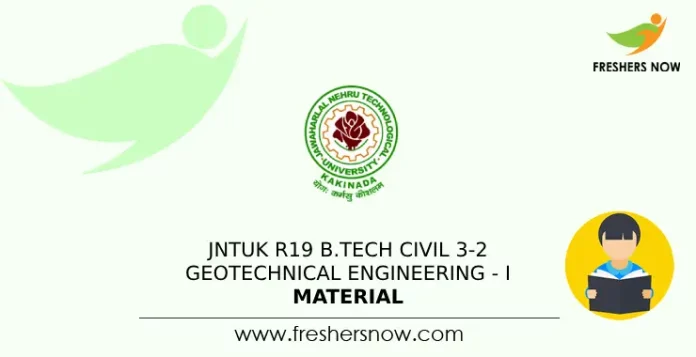
JNTUK R19 B.Tech Civil 3-2 Geotechnical Engineering – I Material/ Notes PDF Download: Looking for JNTUK R19 B.Tech Civil 3-2 Geotechnical Engineering – I Material? You’re at the right place! Our material covers everything you need to know about Geotechnical Engineering – I for JNTUK R19 B.Tech Civil students. We help you understand how to find soil index properties and classify them correctly. You’ll also learn about water seepage through soils and how to calculate seepage discharge.
We explain the difference between compaction and consolidation of soils, including how to measure settlement rates. Plus, we cover shear strength in soils, teaching you how to assess shear parameters in sands and clays and where they’re applied. With our JNTUK R19 B.Tech Civil 3-2 Geotechnical Engineering – I Notes and PDF downloads, mastering geotechnical engineering concepts is easy!
JNTUK R19 B.Tech Civil 3-2 Geotechnical Engineering – I Material – Units
| No. Of Units | Name of the Unit |
| Unit – 1 | Introduction, Index Properties of Soils |
| Unit – 2 | Permeability, Geostatic Stresses, Seepage |
| Unit – 3 | Stress Distribution In Soils |
| Unit – 4 | Compaction, Consolidation |
| Unit – 5 | Shear Strength of Soils |
Unit 1 Syllabus PDF Download | JNTUK R19 B.Tech Civil Geotechnical Engineering – I Material
Introduction: Soil formation – soil structure and clay mineralogy – Adsorbed water – Mass- volume relationship –Relative density
Index Properties of Soils: Grain size analysis – Sieve and Hydrometer methods – consistency limits and indices – Various Types of soil Classifications – Unified soil classification and I.S. Soil classification.
| JNTUK R19 B.Tech Civil 3-2 Geotechnical Engineering – I Material – PDF Download | |
| To Download The JNTUK R19 B.Tech Civil 3-2 Geotechnical Engineering – I Unit 1 Notes PDF | Download PDF |
Unit 2 Syllabus PDF Download | JNTUK R19 B.Tech Civil Geotechnical Engineering – I Material
Permeability: Soil water – capillary rise – One dimensioned flow of water through soils – Darcy’s law- permeability – Factors affecting –laboratory determination of coefficient of permeability – Permeability of layered systems.
Geostatic Stresses: Total, neutral, and effective stresses –a quicksand condition
Seepage: 2-D flow and Laplace’s equation – Seepage through soils –Flow nets: Characteristics and Uses.
| JNTUK R19 B.Tech Civil 3-2 Geotechnical Engineering – I Material – PDF Download | |
| To Download The JNTUK R19 B.Tech Civil 3-2 Geotechnical Engineering – I Unit 2 Notes PDF | Download PDF |
Unit 3 Syllabus PDF Download | JNTUK R19 B.Tech Civil Geotechnical Engineering – I Material
Stress Distribution In Soils: Stresses induced by applied loads – Boussinesq’s and Westergaard’s theories for point loads and areas of different shapes– Newmark’s influence chart – 2:1 stress distribution method.
| JNTUK R19 B.Tech Civil 3-2 Geotechnical Engineering – I Material – PDF Download | |
| To Download The JNTUK R19 B.Tech Civil 3-2 Geotechnical Engineering – I Unit 3 Notes PDF | Download PDF |
Unit 4 Syllabus PDF Download | JNTUK R19 B.Tech Civil Geotechnical Engineering – I Material
Compaction: Mechanism of compaction – factors affecting – effects of compaction on soil properties – compaction control.
Consolidation: Compressibility of soils – e-p and e-log p curves – Stress history – Concept of consolidation – Spring Analogy – Terzaghi’s theory of one-dimensional Consolidation – Time rate of consolidation and degree of consolidation – Determination of coefficient of consolidation (cv) – Over consolidated and normally consolidated clays.
| JNTUK R19 B.Tech Civil 3-2 Geotechnical Engineering – I Material – PDF Download | |
| To Download The JNTUK R19 B.Tech Civil 3-2 Geotechnical Engineering – I Unit 4 Notes PDF | Download PDF |
Unit 5 Syllabus PDF Download | JNTUK R19 B.Tech Civil Geotechnical Engineering – I Material
Shear Strength of Soils: Basic mechanism of shear strength – Mohr-Coulomb Failure theories – Stress-Strain behavior of Sands – Critical Void Ratio – Stress-Strain behavior of clays – Shear Strength determination- various drainage conditions.
| JNTUK R19 B.Tech Civil 3-2 Geotechnical Engineering – I Material – PDF Download | |
| To Download The JNTUK R19 B.Tech Civil 3-2 Geotechnical Engineering – I Unit 5 Notes PDF | Download PDF |
JNTUK R19 B.Tech Geotechnical Engineering – I Material – Outcomes
- Understanding Soil Parameters: Students must grasp the definitions of different soil mechanics parameters and understand how they relate to each other.
- Determining Index Properties: Students should learn methods to determine various index properties of soils and how to classify them based on these properties.
- Recognizing Engineering Properties: Students need to understand the importance of engineering properties like compaction, permeability, consolidation, and shear strength of soil. They should also be able to determine these properties in laboratory tests.
- Applying Concepts in Civil Engineering: Students should apply the concepts they learn in soil mechanics to real-world civil engineering practices daily. This includes understanding how soil properties affect the design and construction of structures.
- Practical Application: Through practical application, students can gain insight into how soil mechanics concepts impact construction projects, from building foundations to road construction, ensuring safe and stable structures.
For more details about JNTUK R19 B.Tech Civil 3-2 Geotechnical Engineering – I Material and other materials follow our official website Freshersnow.com.



